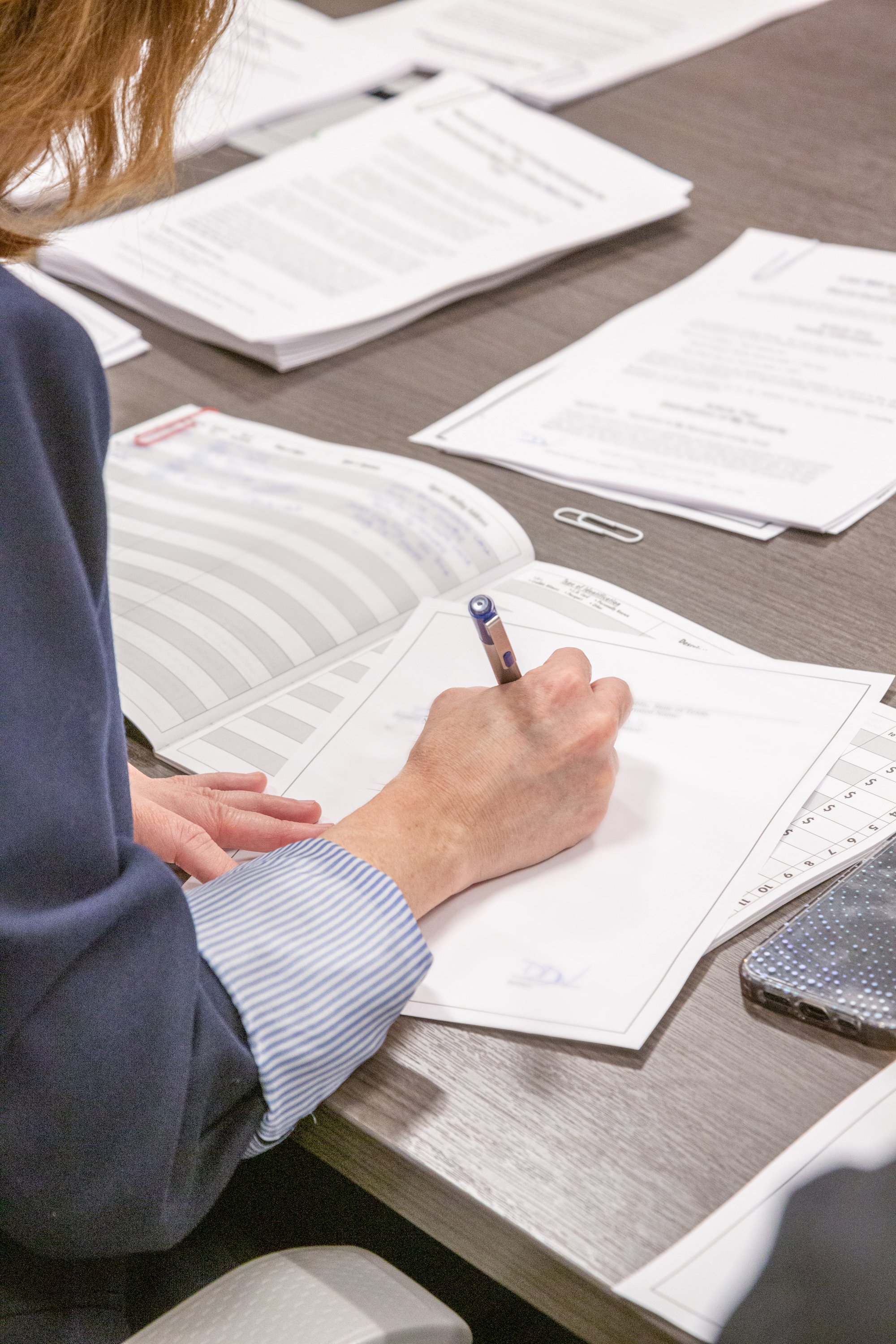
Helping you pick up the pieces
Probate
Probate is a critical legal process that takes place after someone passes away, ensuring that their estate is properly managed, debts are settled, and assets are distributed according to their wishes. While the term may seem daunting, probate plays a vital role in protecting your family and ensuring a smooth transition of assets.
Why Probate Matters for Your Family:
Guarantees Your Wishes Are Followed
Probate validates your will and ensures that your assets are distributed to the people you’ve chosen. Without this process, your estate could be subject to state laws that may not align with your intentions.Provides Legal Clarity
By going through probate, your family avoids confusion and potential legal disputes. The probate process offers transparency, ensuring fairness among heirs and helping prevent conflicts.Settles Debts and Taxes
Probate helps ensure that any outstanding debts, taxes, or obligations are handled before your assets are passed on to your beneficiaries. This protects your heirs from unexpected financial burdens.Protects Against Fraud
During probate, the court oversees the distribution of your estate, which helps protect against fraudulent claims or unauthorized asset transfers. This gives your family peace of mind that everything is handled legally.Handles Complex Situations
If your estate involves multiple properties, business interests, or a large number of beneficiaries, probate ensures everything is properly accounted for and distributed according to the law.
At Ortego Law Firm, we understand that probate can seem overwhelming, but we’re here to guide you through every step. Our experienced team will ensure that your estate is handled efficiently and with care, protecting your family’s future and honoring your wishes.

Quick Breakdown of Service
What it is: The legal process of resolving a person’s affairs after he or she dies. Probate involves gathering property, paying certain creditors, and distributing the deceased person’s property to his or her heirs.
Who needs it most: Anyone in need of transferring property from a deceased person’s name to that person’s family or heirs.
Why it’s necessary: When a person dies, that person may own bank accounts, real estate, or other property and that property needs to be transferred to his or her heirs. Many times the probate process with the proper Court orders is necessary to transfer the property.
Our Probate Services
-
In cases where the deceased person left a properly drafted Will or the heirs are in agreement, an independent probate administration is available. The Independent Executor or Administrator can act without court oversight in most matters.
-
When the deceased person did not leave a Will or the person left a Will but did not appoint an Independent Executor, then a dependent administration is available. The Dependent Administrator has to report back to the Court annually and has to seek court approval for actions in their role as the Administrator.
-
When the deceased person did not leave a Will or the Will did not dispose of all the decedent’s property, then a judicial determination of heirship may be necessary. This process requires two disinterested witnesses to testify under oath identifying the heirs of the deceased person.
-
In situations where the decedent left a Will, a probate as muniment of title may be an appropriate probate procedure. In this case, no personal representative (Executor or Administrator) is appointed to represent the estate but the Will is admitted to probate for the purpose of transferring property. This only applies in certain cases after a thorough analysis of the needs of the beneficiaries by the probate attorney.
-
When a person has not left a Will and the estate qualifies, this may be the appropriate probate procedure. In this case, no personal representative (Executor or Administrator) is appointed to represent the estate but a determination of heirs is made for the purpose of transferring property. This only applies in certain cases after a thorough analysis of the specific case by the probate attorney.
Alternatives to Probate:
-
If there is no necessity for the probate of the estate, then an affidavit of heirship may be an appropriate alternative to probate. This only applies in certain cases after a thorough analysis of the specific case by the probate attorney.
-
If the only property still in the Decedent’s name is real estate and the title to the real estate allows for a transfer upon the death of the Decedent, then an affidavit of death may be the only thing needed to transfer the real estate. This only applies in certain cases after a thorough analysis of the specific case by the probate attorney.
FAQs
-
The length of time it will take to complete the probate process depends upon the type of probate
available to you and many other factors. The fastest probate cases are typically those in which
the decedent left a well written, self-proven Will and the Applicant is doing either a probate as
muniment of title or independent administration. In the best-case scenario, the probate process
will take 2-4 months. In cases where the person did not leave a Will and there is a dependent
administration and determination of heirship, the best case scenario is 6 months, but it often
takes longer.
-
Yes. If you are doing an independent administration, dependent administration, determination of
heirship, or probate as muniment of title, you will need to go to court. Many of the courts (but not
all) offer Zoom hearings in certain cases. A probate court hearing is usually straightforward and
looks nothing like court hearings on TV. We prepare our clients ahead of time so they what to
expect.
-
This is probably the most common question we get related to decedent’s estates. The answer to
this question depends on many factors. Your attorney needs to review the current title
ownership and consult with you to determine what type of probate (if any) is needed. The
outcome of the probate process or the alternative to probate involves transferring the ownership
from the deceased person to the heirs or beneficiaries of the person’s Will. The form that takes
depends on the specific situation.
What to Expect with Working with a Notary
Here’s what to keep in mind when working with a notary:
Bring Valid Identification
Notaries must verify your identity to legally notarize a document. Be prepared to show a government-issued photo ID such as a driver’s license or passport. The ID must be current and unexpired.
Don’t Sign in Advance
It’s important that the notary witnesses you sign the document. If you sign it beforehand, the notary may be unable to proceed. Bring the unsigned document with you to the appointment and wait until you're in front of the notary.
Some Documents Require Witnesses
Depending on what you're signing (like a will or medical directive), you may also need one or more witnesses in addition to the notary. The notary cannot usually serve as a witness, so be sure to clarify this before your appointment.
Where to Find a Notary
Notaries can be found at:
Banks or credit unions
Mail and shipping centers (like UPS or FedEx stores)
Hospitals and long-term care facilities (check availability)
Local libraries or city offices
Mobile notary directories online
We recommend calling ahead to confirm hours, availability, and any specific requirements.
Our Frequently Asked Questions About Notary Process.
-
All you need to bring is proof of Identification and the document that needs to be notarized.
-
Only if the documents we prepare are notarized in our office, you will need to schedule a time to come in for the signing. These appointments typically take 20-30 minutes. Online and in-person notary services have their own charges, you will be responsible for the fees, as we do not cover these expenses.
-
No, you can sign in different places on different days. Don’t worry about that issue or the date on the first page at the top. I usually complete the date right before we record it and use the latest signature date in the document.
-
Yes, you can use an online Texas notary. You can be anywhere in the world, but the notary needs to be officially registered as a Texas online notary and he or she must physically be in Texas when online notarization occurs.
We recommend John Gann for online notary services. The link to his contact information is below. Be aware that his email address is jgann@txnotary.co not jgann@txnotary.com
About TX Notary Company | Remote Online Notary Services If you work with John Gann, instruct him to send the completed signed document to: info@lawortego.com
-
You can do that, but the recording fees will be higher by about $10.
-
You will print out the document and sign it in front of a notary. We will need the original physical copy in our office for recording in the deed records.
DO NOT SEND VIA US Postal Service. Please send any originals via private delivery such as FedEx or UPS to:
Ortego Law Firm 24285 Katy Fwy. Suite 300, Katy, Texas 77494.

How to get started.
-

01
Complete Our Online Intake Form
Get started from the comfort of your home by filling out our easy-to-use online intake form. This helps us gather important details about your situation, so we can hit the ground running when we meet.
-

02
Call Us Directly
Prefer to talk? We’re just a phone call or email away. Reach out to us with your questions or concerns, and one of our friendly team members will guide you through the next steps in protecting your assets and family.



